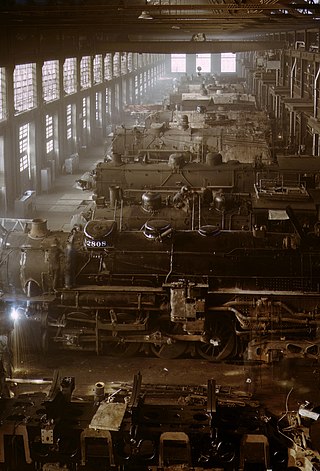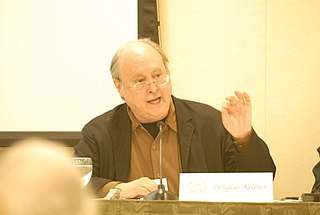
Anti-capitalism is a political ideology and movement encompassing a variety of attitudes and ideas that oppose capitalism. In this sense, anti-capitalists are those who wish to replace capitalism with another type of economic system, such as socialism or communism.

The Frankfurt School is a school of thought in sociology and critical philosophy. It is associated with the Institute for Social Research founded at Goethe University Frankfurt in 1923. Formed during the Weimar Republic during the European interwar period, the first generation of the Frankfurt School was composed of intellectuals, academics, and political dissidents dissatisfied with the contemporary socio-economic systems of the 1930s; namely, capitalism, fascism, and communism.

In sociology, an industrial society is a society driven by the use of technology and machinery to enable mass production, supporting a large population with a high capacity for division of labour. Such a structure developed in the Western world in the period of time following the Industrial Revolution, and replaced the agrarian societies of the pre-modern, pre-industrial age. Industrial societies are generally mass societies, and may be succeeded by an information society. They are often contrasted with traditional societies.

Paul Mattick Sr. was a German-American Marxist political writer and social revolutionary, whose thought can be placed within the council communist and left communist traditions.
Raya Dunayevskaya, later Rae Spiegel, also known by the pseudonym Freddie Forest, was the American founder of the philosophy of Marxist humanism in the United States. At one time Leon Trotsky's secretary, she later split with him and ultimately founded the organization News and Letters Committees and was its leader until her death.
Marxism is a political philosophy and method of socioeconomic analysis. It uses a materialist interpretation of historical development, better known as "historical materialism," to understand class relations and social conflict. It also uses a dialectical perspective to view social transformation. Marxism originates from the works of 19th-century German philosophers Karl Marx and Friedrich Engels. Marxism has developed over time into various branches and schools of thought, As a result, there is no single, definitive Marxist theory. Marxism has had a profound impact in shaping the modern world, with various left-wing and far-left political movements taking inspiration from it in varying local contexts.

Eros and Civilization: A Philosophical Inquiry into Freud is a book by the German philosopher and social critic Herbert Marcuse, in which the author proposes a non-repressive society, attempts a synthesis of the theories of Karl Marx and Sigmund Freud, and explores the potential of collective memory to be a source of disobedience and revolt and point the way to an alternative future. Its title alludes to Freud's Civilization and Its Discontents (1930). The 1966 edition has an added "political preface".
Freudo-Marxism is a loose designation for philosophical perspectives informed by both the Marxist philosophy of Karl Marx and the psychoanalytic theory of Sigmund Freud. Its history within continental philosophy began in the 1920s and '30s and running since through critical theory, Lacanian psychoanalysis, and post-structuralism.
Technological rationality or technical rationality is a philosophical idea postulated by the Frankfurt School philosopher Herbert Marcuse in his 1941 article, "Some Social Implications of Modern Technology," published first in the journal Studies in Philosophy and Social Sciences, Vol. IX. It gained mainstream repute and a more holistic treatment in his 1964 book One-Dimensional Man.
Aesopian language is a means of communication with the intent to convey a concealed meaning to informed members of a conspiracy or underground movement, whilst simultaneously maintaining the guise of an innocent meaning to outsiders. The terminology refers to the allegorical writings of ancient Greek fabulist Aesop.

Douglas Kellner is an American academic who works at the intersection of "third-generation" critical theory in the tradition of the Frankfurt Institute for Social Research, or Frankfurt School, and in cultural studies in the tradition of the Birmingham Centre for Contemporary Cultural Studies, or the "Birmingham School". He has argued that these two conflicting philosophies are in fact compatible. He is currently the George Kneller Chair in the Philosophy of Education in the Graduate School of Education and Information Studies at the University of California, Los Angeles.
Stéphan Barron was the first to develop the concept of Technoromanticism between 1991 and 1996 for his doctoral thesis at the University Paris VIII. The main theme of his research is what he calls “Technoromantisme/Technoromanticism”, a neologism which he created and which has been adopted by other English-speaking researchers. Technoromanticism is the theory of links between art and new technologies, within the context of the threats posed to nature by technoscience and economic development. Technoromanticism also seeks to analyse the return of the human body within technological arts, formulating the hypothesis that a technological society needs a corporeal rebalancing of perceptions. Delayed for editorial reasons, his book Technoromantisme was published by l'Harmattan in 2003. Technoromanticism is a term used to indicate those aspects of contemporary culture that ascribe to advanced technologies the capacity to promote the power of the imagination, to restore the role of genius and to bring about a unity; in other words that revive and perpetuate the legacy of the eighteenth- and nineteenth-century artistic and philosophical movement known as Romanticism, but by technological means. The term was used in 1999 in a book that bore the title Technoromanticism outlining evidence of romanticism in many commentaries on digital technology at the time.
Repressive desublimation is a term, first coined by Frankfurt School philosopher and sociologist Herbert Marcuse in his 1964 work One-Dimensional Man, that refers to the way in which, in advanced industrial society (capitalism), "the progress of technological rationality is liquidating the oppositional and transcending elements in the “higher culture.” In other words, where art was previously a way to represent "that which is" from "that which is not," capitalist society causes the "flattening out" of art into a commodity incorporated into society itself. As Marcuse put it in One-Dimensional Man, "The music of the soul is also the music of salesmanship."
Marxism is a method of socioeconomic analysis that originates in the works of 19th century German philosophers Karl Marx and Friedrich Engels. Marxism analyzes and critiques the development of class society and especially of capitalism as well as the role of class struggles in systemic, economic, social and political change. It frames capitalism through a paradigm of exploitation and analyzes class relations and social conflict using a materialist interpretation of historical development – materialist in the sense that the politics and ideas of an epoch are determined by the way in which material production is carried on.
Neo-Marxism is a collection of Marxist schools of thought originating from 20th-century approaches to amend or extend Marxism and Marxist theory, typically by incorporating elements from other intellectual traditions such as critical theory, psychoanalysis, or existentialism. Neo-Marxism comes under the broader framework of the New Left. In a sociological sense, neo-Marxism adds Max Weber's broader understanding of social inequality, such as status and power, to Marxist philosophy.

Herbert Marcuse was a German-American philosopher, social critic, and political theorist, associated with the Frankfurt School of critical theory. Born in Berlin, Marcuse studied at the Humboldt University of Berlin and then at Freiburg, where he received his PhD. He was a prominent figure in the Frankfurt-based Institute for Social Research – what later became known as the Frankfurt School. In his written works, he criticized capitalism, modern technology, Soviet Communism, and popular culture, arguing that they represent new forms of social control.

Soviet Marxism: A Critical Analysis is a 1958 book by the philosopher Herbert Marcuse, in which the author provides a critique of the Ideology of the Communist Party of the Soviet Union. It received positive reviews, describing it as a convincing discussion of its subject.
Western Marxism is a current of Marxist theory that arose from Western and Central Europe in the aftermath of the 1917 October Revolution in Russia and the ascent of Leninism. The term denotes a loose collection of theorists who advanced an interpretation of Marxism distinct from classical and Orthodox Marxism and the Marxism-Leninism of the Soviet Union.

Hegel's Ontology and the Theory of Historicity is a 1932 book about the philosopher Georg Wilhelm Friedrich Hegel and his theory of historicity by the philosopher Herbert Marcuse. It is influenced by the philosopher Martin Heidegger.
Marxist cultural analysis is a form of cultural analysis and anti-capitalist cultural critique, which assumes the theory of cultural hegemony and from this specifically targets those aspects of culture which are profit driven and mass-produced under capitalism.










